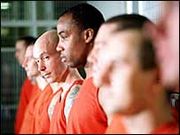
The Experiment
Encyclopedia
The Experiment was a documentary series broadcast on BBC
television in 2002. It presented the findings of what subsequently became known as The BBC Prison Study (Reicher & Haslam, 2006)
carried out by Philip Zimbardo
at Stanford University
, in which a group of students were recruited to perform the roles of 'prisoner' and 'guard' as a psychological experiment to test how human beings conform to roles. That study was brought to a premature end as a result of the extreme brutality displayed by guards towards prisoners. This itself was related to the Milgram experiment
at Yale University
in 1963.
The BBC Experiment was led by psychologists Professor Alex Haslam
(University of Exeter
) and Professor Steve Reicher
(University of St Andrews
) who planned and designed the psychological experiment with the series' executive producer Nick Mirsky and producer Gaby Koppel of the BBC
. At the time, Reicher was editor of the British Journal of Social Psychology
and Haslam was editor-elect of the European Journal of Social Psychology
.
in December 2001, the four one-hour programmes were broadcast
on 14th, 15th, 21st and 22nd May 2002. The four episodes dealt sequentially with each of the main phases of the study: Conflict, Order, Rebellion and Tyranny.

The findings of the study were very different from those of the Stanford Prison Experiment
. In particular, (a) there was no evidence of guards conforming 'naturally' to role, and (b) in response to manipulations that served to increase a sense of shared identity amongst the prisoners, over time, they demonstrated increased resistance to the guards' regime. This culminated in a prison breakout on Day 6 of the study that made the regime unworkable. After this, the participants created a 'self-governing commune' but this too collapsed due to internal tensions created by those who had organized the earlier breakout. After this, a group of former prisoners and guards conspired to install a new prisoner-guard regime in which they would be the "new guards". Now, however, they wanted to run the system along much harsher lines — akin to those seen in the Stanford study. Signs that this would compromise the well-being of participants led to early termination of the study.
 The series courted controversy, and was criticised by Philip Zimbardo
The series courted controversy, and was criticised by Philip Zimbardo
who said that his original experiment did not need repeating. He also claimed that The Experiment was simply reality television
and that it had no scientific base or value, as participants would be playing for the cameras and not acting "normally" (Zimbardo, 2006). In turn, Haslam and Reicher have responded that their goal was not to replicate the Stanford study, but rather to expose limitations in Zimbardo's own theorizing and method. In particular, they sought to demonstrate that internalized group membership could be a basis for resistance as well as tyranny. This prediction was derived from social identity theory (Tajfel & Turner, 1979) and the study incorporated manipulations designed to test some of its core hypotheses.
Haslam and Reicher also argue that Zimbardo's own findings in the Stanford study arose from the leadership role that he had assumed as Prison superintendent — explicitly encouraging the guards to demean the prisoners (see Banyard, 2007). Accordingly, in their study, Haslam and Reicher had no formal role within the prison. They also took non-reactive psychometric and physiological measures to back up and triangulate their behavioural observations and address concerns that the processes observed in the study were somehow 'unreal'.
Zimbardo's (2006) final criticism is that the findings of the BBC study lacked external validity, since prisoner domination of guards is not observed "anywhere in the known universe". Haslam and Reicher have countered that the purpose of their study was to demonstrate the theoretical possibility of resistance, noting that this is a feature of most social systems in which tyranny prevails (e.g., as argued by Michel Foucault
). They also observe that the imprisonment of leaders is often important for the development of resistance movements and for processes of social change. Notable recent cases include Robben Island
and the Maze
where it was ultimately the prisoners who ran the prisons, not the guards. The stress observed among guards in the BBC study (see Haslam & Reicher, 2006) also accords with a large body of evidence from the UK and the US that prison officers are particularly prone to high levels of stress and burnout. In 2001 a major report by the US-based group Human Rights Watch
also concluded that cases of prison authorities ceding control to inmates was "an all too common occurrence".
These papers challenged the role-based analysis forwarded by Zimbardo and served to elaborate ideas associated with a social identity approach to social, clinical and organizational psychology. One of their central arguments is that individuals only move towards tyranny once they have come to identify with a group and its leadership (in a way that Zimbardo's briefing of his guards encouraged) and once an authoritarian agenda has come to define that group's identity and to be seen as a solution to its problems.
Reflecting its contribution to ongoing debate in this area, in 2007 the BBC Prison study was included in the OCR
examination board's Psychology A-level syllabus.
BBC
The British Broadcasting Corporation is a British public service broadcaster. Its headquarters is at Broadcasting House in the City of Westminster, London. It is the largest broadcaster in the world, with about 23,000 staff...
television in 2002. It presented the findings of what subsequently became known as The BBC Prison Study (Reicher & Haslam, 2006)
Background
The genesis of the programme was the 1971 Stanford prison experimentStanford prison experiment
The Stanford prison experiment was a study of the psychological effects of becoming a prisoner or prison guard. The experiment was conducted from August 14th-20th, 1971, by a team of researchers led by psychology professor Philip Zimbardo at Stanford University...
carried out by Philip Zimbardo
Philip Zimbardo
Philip George Zimbardo is an American psychologist and a professor emeritus at Stanford University. He is president of the Heroic Imagination Project...
at Stanford University
Stanford University
The Leland Stanford Junior University, commonly referred to as Stanford University or Stanford, is a private research university on an campus located near Palo Alto, California. It is situated in the northwestern Santa Clara Valley on the San Francisco Peninsula, approximately northwest of San...
, in which a group of students were recruited to perform the roles of 'prisoner' and 'guard' as a psychological experiment to test how human beings conform to roles. That study was brought to a premature end as a result of the extreme brutality displayed by guards towards prisoners. This itself was related to the Milgram experiment
Milgram experiment
The Milgram experiment on obedience to authority figures was a series of notable social psychology experiments conducted by Yale University psychologist Stanley Milgram, which measured the willingness of study participants to obey an authority figure who instructed them to perform acts that...
at Yale University
Yale University
Yale University is a private, Ivy League university located in New Haven, Connecticut, United States. Founded in 1701 in the Colony of Connecticut, the university is the third-oldest institution of higher education in the United States...
in 1963.
The BBC Experiment was led by psychologists Professor Alex Haslam
Alex Haslam
S. Alexander Haslam is a Professor of Social Psychology in the School of Psychology at the University of Exeter. He was born in Horsforth , and educated at Felsted School....
(University of Exeter
University of Exeter
The University of Exeter is a public university in South West England. It belongs to the 1994 Group, an association of 19 of the United Kingdom's smaller research-intensive universities....
) and Professor Steve Reicher
Steve Reicher
Stephen D Reicher is Professor of Social Psychology and former Head of the School of Psychology at the University of St Andrews....
(University of St Andrews
University of St Andrews
The University of St Andrews, informally referred to as "St Andrews", is the oldest university in Scotland and the third oldest in the English-speaking world after Oxford and Cambridge. The university is situated in the town of St Andrews, Fife, on the east coast of Scotland. It was founded between...
) who planned and designed the psychological experiment with the series' executive producer Nick Mirsky and producer Gaby Koppel of the BBC
BBC
The British Broadcasting Corporation is a British public service broadcaster. Its headquarters is at Broadcasting House in the City of Westminster, London. It is the largest broadcaster in the world, with about 23,000 staff...
. At the time, Reicher was editor of the British Journal of Social Psychology
British Journal of Social Psychology
British Journal of Social Psychology is a journal published by the British Psychological Society . It publishes original papers on subjects like social cognition, attitudes, group processes, social influence, intergroup relations, self and identity, nonverbal communication, and social psychological...
and Haslam was editor-elect of the European Journal of Social Psychology
European Journal of Social Psychology
European Journal of Social Psychology is a journal published by John Wiley & Sons. It publishes original papers on subjects like social cognition, attitudes, group processes, social influence, intergroup relations, self and identity, nonverbal communication, and social psychological aspects of...
.
Ethical considerations
Before The Experiment could proceed, the researchers had to secure formal ethical approval from the University of Exeter. This approval was conditional on the BBC putting in place a range of safeguards to protect against psychological damage to the participants. Key safeguards included:- Screening of participants by clinical psychologists, together with medical and police checks.
- Round-the-clock monitoring by clinical psychologists, medics and security personnel.
- The creation of a six-person EthicsEthicsEthics, also known as moral philosophy, is a branch of philosophy that addresses questions about morality—that is, concepts such as good and evil, right and wrong, virtue and vice, justice and crime, etc.Major branches of ethics include:...
Committee, chaired by Lembit ÖpikLembit ÖpikLembit Öpik is a British Liberal Democrat politician. He was the Member of Parliament for the constituency of Montgomeryshire in Wales from 1997 until he lost his seat in the 2010 General Election...
MP. Members of this Committee included Dr Stephen Smith of the Beth ShalomBeth ShalomBeth Shalom is a Holocaust memorial centre near Laxton in Nottinghamshire in England. Opened in 1995, it is England's only Holocaust museum...
Centre, and Steven Taylor, a prison reformPrison reformPrison reform is the attempt to improve conditions inside prisons, aiming at a more effective penal system.-History:Prisons have only been used as the primary punishment for criminal acts in the last couple of centuries...
campaigner. This committee was given the power to stop The Experiment at any time if a majority of the six members felt that participants were coming to psychological or other harm. This was the first time that the BBC had given such power to an external, independent body. This power was used when The Experiment was brought to an end two days earlier than planned, after consultation with Haslam and Reicher.
Production, broadcast and content
Filmed at Elstree StudiosElstree Studios
"Elstree Studios" refers to any of several film studios that were based in the towns of Borehamwood and Elstree in Hertfordshire, England, since film production begun in 1927.-Name:...
in December 2001, the four one-hour programmes were broadcast
Broadcasting
Broadcasting is the distribution of audio and video content to a dispersed audience via any audio visual medium. Receiving parties may include the general public or a relatively large subset of thereof...
on 14th, 15th, 21st and 22nd May 2002. The four episodes dealt sequentially with each of the main phases of the study: Conflict, Order, Rebellion and Tyranny.
Findings

The findings of the study were very different from those of the Stanford Prison Experiment
Stanford prison experiment
The Stanford prison experiment was a study of the psychological effects of becoming a prisoner or prison guard. The experiment was conducted from August 14th-20th, 1971, by a team of researchers led by psychology professor Philip Zimbardo at Stanford University...
. In particular, (a) there was no evidence of guards conforming 'naturally' to role, and (b) in response to manipulations that served to increase a sense of shared identity amongst the prisoners, over time, they demonstrated increased resistance to the guards' regime. This culminated in a prison breakout on Day 6 of the study that made the regime unworkable. After this, the participants created a 'self-governing commune' but this too collapsed due to internal tensions created by those who had organized the earlier breakout. After this, a group of former prisoners and guards conspired to install a new prisoner-guard regime in which they would be the "new guards". Now, however, they wanted to run the system along much harsher lines — akin to those seen in the Stanford study. Signs that this would compromise the well-being of participants led to early termination of the study.
Controversy

Philip Zimbardo
Philip George Zimbardo is an American psychologist and a professor emeritus at Stanford University. He is president of the Heroic Imagination Project...
who said that his original experiment did not need repeating. He also claimed that The Experiment was simply reality television
Reality television
Reality television is a genre of television programming that presents purportedly unscripted dramatic or humorous situations, documents actual events, and usually features ordinary people instead of professional actors, sometimes in a contest or other situation where a prize is awarded...
and that it had no scientific base or value, as participants would be playing for the cameras and not acting "normally" (Zimbardo, 2006). In turn, Haslam and Reicher have responded that their goal was not to replicate the Stanford study, but rather to expose limitations in Zimbardo's own theorizing and method. In particular, they sought to demonstrate that internalized group membership could be a basis for resistance as well as tyranny. This prediction was derived from social identity theory (Tajfel & Turner, 1979) and the study incorporated manipulations designed to test some of its core hypotheses.
Haslam and Reicher also argue that Zimbardo's own findings in the Stanford study arose from the leadership role that he had assumed as Prison superintendent — explicitly encouraging the guards to demean the prisoners (see Banyard, 2007). Accordingly, in their study, Haslam and Reicher had no formal role within the prison. They also took non-reactive psychometric and physiological measures to back up and triangulate their behavioural observations and address concerns that the processes observed in the study were somehow 'unreal'.
Zimbardo's (2006) final criticism is that the findings of the BBC study lacked external validity, since prisoner domination of guards is not observed "anywhere in the known universe". Haslam and Reicher have countered that the purpose of their study was to demonstrate the theoretical possibility of resistance, noting that this is a feature of most social systems in which tyranny prevails (e.g., as argued by Michel Foucault
Michel Foucault
Michel Foucault , born Paul-Michel Foucault , was a French philosopher, social theorist and historian of ideas...
). They also observe that the imprisonment of leaders is often important for the development of resistance movements and for processes of social change. Notable recent cases include Robben Island
Robben Island
Robben Island is an island in Table Bay, 6.9 km west of the coast of Bloubergstrand, Cape Town, South Africa. The name is Dutch for "seal island". Robben Island is roughly oval in shape, 3.3 km long north-south, and 1.9 km wide, with an area of 5.07 km². It is flat and only a...
and the Maze
Maze (HM Prison)
Her Majesty's Prison Maze was a prison in Northern Ireland that was used to house paramilitary prisoners during the Troubles from mid-1971 to mid-2000....
where it was ultimately the prisoners who ran the prisons, not the guards. The stress observed among guards in the BBC study (see Haslam & Reicher, 2006) also accords with a large body of evidence from the UK and the US that prison officers are particularly prone to high levels of stress and burnout. In 2001 a major report by the US-based group Human Rights Watch
Human Rights Watch
Human Rights Watch is an international non-governmental organization that conducts research and advocacy on human rights. Its headquarters are in New York City and it has offices in Berlin, Beirut, Brussels, Chicago, Geneva, Johannesburg, London, Los Angeles, Moscow, Paris, San Francisco, Tokyo,...
also concluded that cases of prison authorities ceding control to inmates was "an all too common occurrence".
Academic output
Confounding initial criticism, findings of the BBC study were reported in scientific papers that were published in leading peer-reviewed journals. These papers addressed the dynamics of tyranny, resistance, stress and leadership. Indeed, it is possible that the study has formed the basis for more academic papers than any other single field experiment in psychology.These papers challenged the role-based analysis forwarded by Zimbardo and served to elaborate ideas associated with a social identity approach to social, clinical and organizational psychology. One of their central arguments is that individuals only move towards tyranny once they have come to identify with a group and its leadership (in a way that Zimbardo's briefing of his guards encouraged) and once an authoritarian agenda has come to define that group's identity and to be seen as a solution to its problems.
Reflecting its contribution to ongoing debate in this area, in 2007 the BBC Prison study was included in the OCR
OCR (examination board)
OCR is an examination board that sets examinations and awards qualifications . It is one of England, Wales and Northern Ireland's five main examination boards....
examination board's Psychology A-level syllabus.

